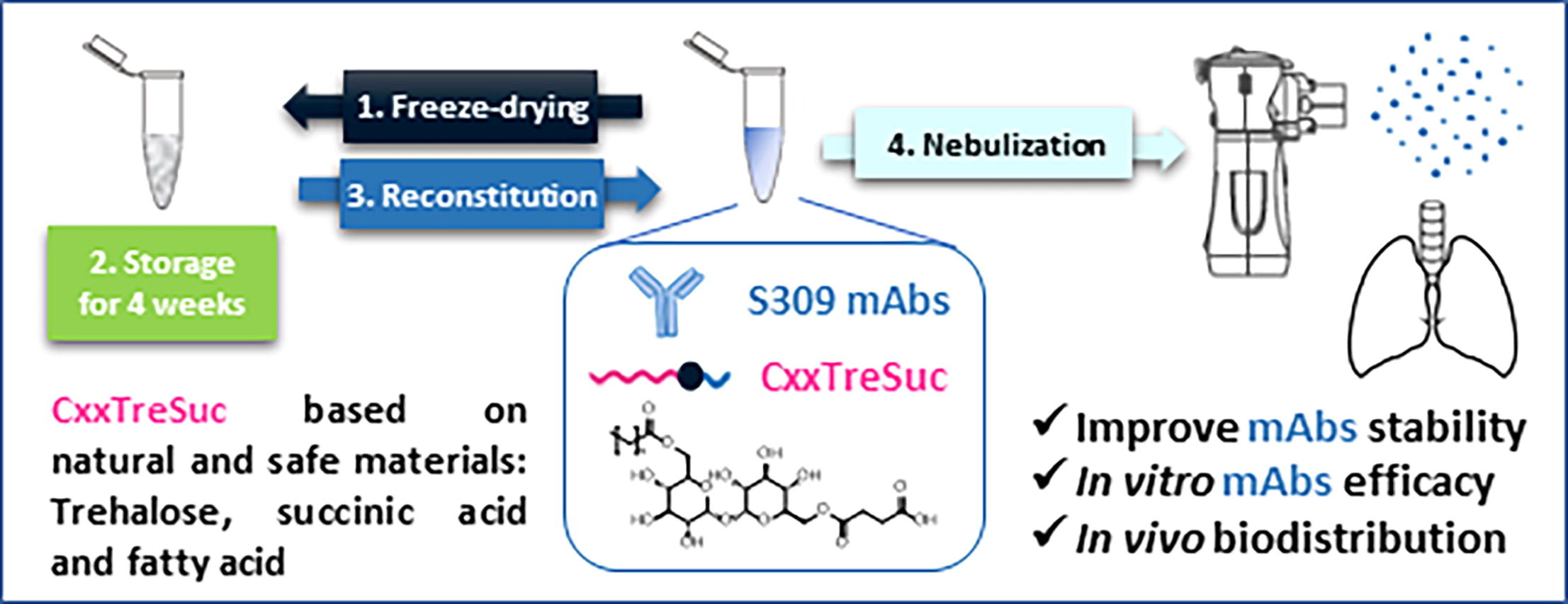Novel trehalose-based excipients for stabilizing nebulized anti-SARS-CoV-2 antibody

COVID-19 is caused by the infection of the lungs by SARS-CoV-2. Monoclonal antibodies, such as sotrovimab, showed great efficiency in neutralizing the virus before its internalization by lung epithelial cells. However, parenteral routes are still the preferred route of administration, even for local infections, which requires injection of high doses of antibody to reach efficacious concentrations in the lungs. Lung administration of antibodies would be more relevant requiring lower doses, thus reducing the costs and the side effects. But aerosolization of therapeutic proteins is very challenging, as the different processes available are harsh and trigger protein aggregation and conformational changes. This decreases the efficiency of the treatment, and can increase its immunogenicity.
Highlights
• Lung delivery of antibody (sotrovimab) for the treatment of COVID-19.
• Synthesis of a series of stabilizing excipients composed of a succinylated trehalose.
• Formulations preserving antibody activity during nebulization/lyophilization process.
• Evidence of in vitro neutralizing effect and in vivo lung distribution of antibody.
• Trehalose-based surfactants are relevant alternative to polysorbate surfactants.
To address those issues, we developed a series of new excipients composed of a trehalose core, a succinyl side chain and a hydrophobic carbon chain (from 8 to 16 carbons). Succinylation increased the solubility of the excipients, allowing their use at relevant concentrations for protein stabilization. In particular, the excipient with 16 carbons (C16TreSuc) used at 5.6 mM was able to preserve colloidal stability and antigen-binding ability of sotrovimab during the nebulization process. It could also be used as a cryoprotectant, allowing storage of sotrovimab in a lyophilized form during weeks. Finally, we demonstrated that C16TreSuc could be used as an excipient to stabilize antibodies for the treatment against COVID-19, by in vitro and in vivo assays. The presence of C16TreSuc during nebulization preserved the neutralization capacity of sotrovimab against SARS-CoV-2 in vitro; an increase of its efficacy was even observed, compared to the non-nebulized control. The in vivo study also showed the wide distribution of sotrovimab in mice lungs, after nebulization with 5.6 mM of excipient.
This work brings a solution to stabilize therapeutic proteins during storage and nebulization, making pulmonary immunotherapy possible in the treatment of COVID-19 and other lung diseases.
Download the full article as PDF here Novel trehalose-based excipients for stabilizing nebulized anti-SARS-CoV-2 antibody
or read it here
Materials
D-(+)-Trehalose anhydrous, Succinic anhydride (TCI Europe), O-(Benzotriazol-1-yl)-N,N,N’,N’-tetramethyluronium-tetrafluorborat (TBTU) (Carl Roth GmbH), Pyridine extra dry over molecular sieve (Thermo Scientific), Benzyl alcohol (Fluka), Myristic acid, Decanoic acid (Acros Organics), Octanoic acid, Palmitic acid (Fluorochem) were used as received without further purification.
For antibody formulation, sotrovimab antibody (PM = 146 kDa, pI = 8.42, monomer percentage = 97.1%, sequence given in Supplementary Information S3) was synthesized by Evitria (Switzerland). Trehalose dihydrate and trehalose surfactants (C8Tre, C10Tre, C14Tre and C16Tre) were provided by Sigma-Aldrich (Merck, USA). Eumulgin SMO 20 (better known as polysorbate 80, or PS80) was purchased to BASF (Germany). PBS was provided by ThermoFisher Scientific (USA). Water was purified (resistivity of 18.2 MΩ.cm at 25°C) using a MilliQ Direct Type 1 Ultrapure water system (Merck, USA).
François Noverraz, Baptiste Robin, Solène Passemard, Bénédicte Fauvel, Jessy Presumey, Emilie Rigal, Alan Cookson, Joël Chopineau, Pierre Martineau, Martin Villalba, Christian Jorgensen, Anne Aubert-Pouëssel, Marie Morille, Sandrine Gerber-Lemaire, Novel trehalose-based excipients for stabilizing nebulized anti-SARS-CoV-2 antibody, International Journal of Pharmaceutics, 2022, 122463, ISSN 0378-5173, https://doi.org/10.1016/j.ijpharm.2022.122463.

